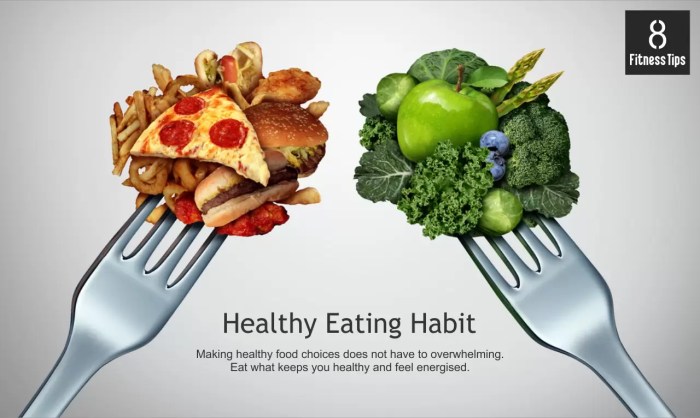Starting off with Healthy Eating Habits, get ready to dive into the world of nutritious choices that can transform your well-being. From understanding the benefits to exploring essential components, this guide has got you covered.
Get ready to embrace a healthier lifestyle with these practical tips and insights that will help you make informed decisions about your diet.
Benefits of Healthy Eating Habits

Eating nutritious foods and maintaining healthy eating habits can bring a plethora of benefits to our overall well-being. By incorporating these habits into our daily routines, we can experience improved energy levels, better mood, and enhanced physical health.
Improved Energy Levels
- Consuming a balanced diet rich in fruits, vegetables, whole grains, and lean proteins provides our bodies with essential nutrients and vitamins that help sustain energy levels throughout the day.
- Staying hydrated by drinking an adequate amount of water also plays a crucial role in maintaining optimal energy levels.
Better Mood
- Eating foods that are high in nutrients, such as omega-3 fatty acids found in fish, can positively impact brain health and mood regulation.
- Avoiding processed foods and excessive sugar intake can help prevent mood swings and promote emotional well-being.
Enhanced Physical Health, Healthy Eating Habits
- Healthy eating habits contribute to maintaining a healthy weight, reducing the risk of obesity, heart disease, diabetes, and other chronic conditions.
- A diet high in fiber can aid in digestion and prevent gastrointestinal issues, promoting overall gut health.
Key Components of a Healthy Diet

Eating a balanced and healthy diet involves incorporating essential food groups and nutrients into your daily meals to support overall well-being and maintain optimal health.
Essential Food Groups
- Fruits and Vegetables: These provide a rich source of vitamins, minerals, and antioxidants essential for various bodily functions. Aim to include a variety of colors to ensure a diverse nutrient intake.
- Proteins: Found in sources like lean meat, poultry, fish, beans, and nuts, proteins are crucial for building and repairing tissues, as well as supporting immune function.
- Carbohydrates: Opt for whole grains, fruits, and vegetables as sources of carbohydrates to provide energy for daily activities and proper brain function.
- Fats: Include healthy fats like those found in avocados, nuts, seeds, and olive oil to support cell growth, protect organs, and aid in nutrient absorption.
Importance of Fruits and Vegetables
Including a variety of fruits and vegetables in your diet is essential due to their high content of vitamins, minerals, and antioxidants that help reduce the risk of chronic diseases, support digestion, and promote overall health.
Role of Proteins, Carbohydrates, and Fats
Proteins are crucial for building and repairing tissues, carbohydrates provide energy for daily activities, and fats support cell growth and nutrient absorption. Balancing these macronutrients in your diet is key to maintaining optimal health and well-being.
Tips for Developing Healthy Eating Habits
To successfully transition to a healthier diet, it’s essential to have practical strategies in place. These tips will help you establish and maintain healthy eating habits for the long term.
Create a Balanced Meal Plan
Creating a balanced meal plan is key to ensuring you’re getting all the necessary nutrients. Include a variety of fruits, vegetables, whole grains, lean proteins, and healthy fats in your daily meals. Plan ahead to avoid last-minute unhealthy choices.
Practice Portion Control
Portion control is crucial when trying to develop healthy eating habits. Use smaller plates, measure your servings, and be mindful of your hunger cues. Avoid mindless snacking and focus on enjoying your meals without distractions.
Stay Hydrated
Drinking an adequate amount of water is essential for overall health and can help prevent overeating. Aim to drink at least 8-10 glasses of water per day, and limit sugary beverages. Carry a reusable water bottle with you to stay hydrated throughout the day.
Meal Prep and Cook at Home
Meal prepping and cooking at home allows you to have more control over the ingredients in your meals. Spend some time each week planning and preparing meals in advance to avoid the temptation of fast food or unhealthy takeout options.
Seek Support and Accountability
Enlist the support of friends, family, or a health coach to help you stay accountable on your journey to healthier eating habits. Join a cooking class, wellness group, or online community to share tips, recipes, and motivation with others.
Focus on Progress, Not Perfection
Remember that developing healthy eating habits is a process, and it’s okay to have occasional slip-ups. Instead of aiming for perfection, focus on making small, sustainable changes over time. Celebrate your successes and learn from any setbacks to continue moving forward.
Impact of Healthy Eating on Physical Health
Healthy eating habits play a crucial role in preventing chronic diseases and maintaining overall physical health. By focusing on nutritious foods and proper hydration, individuals can significantly reduce their risk of developing conditions such as diabetes and heart disease.
Prevention of Chronic Diseases
- Eating a balanced diet rich in fruits, vegetables, whole grains, and lean proteins can help regulate blood sugar levels and reduce the risk of developing diabetes.
- Reducing intake of processed foods high in unhealthy fats and sugars can lower the chances of heart conditions like high cholesterol and hypertension.
Maintaining a Healthy Weight
- Consuming a variety of nutrient-dense foods helps keep the body satisfied and prevents overeating, aiding in weight management.
- Balancing calorie intake with physical activity is essential for achieving and maintaining a healthy weight, reducing the risk of obesity-related health issues.
Importance of Hydration
- Staying hydrated is crucial for proper digestion, nutrient absorption, and overall bodily functions.
- Drinking an adequate amount of water daily can help prevent dehydration, support metabolism, and promote healthy skin and organ function.
Impact of Healthy Eating on Mental Health: Healthy Eating Habits
Eating a nutritious diet not only benefits our physical health but also plays a crucial role in our mental well-being. The foods we consume can have a direct impact on our mood, cognitive function, stress levels, and overall mental clarity.
Foods that Influence Mood and Cognitive Function
Certain foods can positively or negatively affect our mood and cognitive function. For example, foods rich in omega-3 fatty acids like salmon, walnuts, and flaxseeds can help improve mood and reduce symptoms of depression. On the other hand, sugary and processed foods can lead to energy crashes and mood swings.
Nutrition for Reducing Stress and Improving Mental Clarity
A diet rich in antioxidants, vitamins, and minerals can help reduce stress levels and improve mental clarity. Foods like berries, dark leafy greens, and nuts are known to have stress-reducing properties. Additionally, staying hydrated and consuming whole grains can enhance cognitive function and focus.
